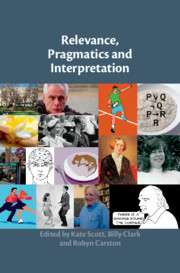Book contents
- Relevance, Pragmatics and Interpretation
- Relevance, Pragmatics and InterpretationEssays in Honour of Deirdre Wilson
- Copyright page
- Contents
- Contributors
- Cover Acknowledgements
- Introduction
- Reflections on the Development of Relevance Theory
- Part I Relevance Theory and Cognitive Communicative Issues
- 1 Scientific Tractability and Relevance Theory
- 2 Language Processing, Relevance and Questions
- 3 Quasi-Factives and Cognitive Efficiency
- 4 Evidential Explicatures and Mismatch Resolution
- 5 Representation and Metarepresentation in Negation
- 6 Pronouns in Free Indirect Discourse
- 7 The Development of Pragmatic Abilities
- Part II Pragmatics and Linguistic Issues
- Part III Figurative Language and Layered Interpretations
- References
- Author Index
- Subject Index
2 - Language Processing, Relevance and Questions
from Part I - Relevance Theory and Cognitive Communicative Issues
Published online by Cambridge University Press: 08 July 2019
- Relevance, Pragmatics and Interpretation
- Relevance, Pragmatics and InterpretationEssays in Honour of Deirdre Wilson
- Copyright page
- Contents
- Contributors
- Cover Acknowledgements
- Introduction
- Reflections on the Development of Relevance Theory
- Part I Relevance Theory and Cognitive Communicative Issues
- 1 Scientific Tractability and Relevance Theory
- 2 Language Processing, Relevance and Questions
- 3 Quasi-Factives and Cognitive Efficiency
- 4 Evidential Explicatures and Mismatch Resolution
- 5 Representation and Metarepresentation in Negation
- 6 Pronouns in Free Indirect Discourse
- 7 The Development of Pragmatic Abilities
- Part II Pragmatics and Linguistic Issues
- Part III Figurative Language and Layered Interpretations
- References
- Author Index
- Subject Index
Summary
The chapter begins by pointing out one particular success of relevance theory: its account of anticipatory processes in language comprehension and of the effects of stress placement on these processes. Richard Breheny aims to build on this by investigating pragmatic processes which anticipate the source of relevance (the intended context) rather than components of linguistic form or content. He reviews recent empirical work on the processing of questions and negation, and draws out its implications for the issue of how the source of relevance is represented in utterance processing. He finds in favour of the relevance-theoretic account and against the currently popular view in formal pragmatics that representations of context take the form of ‘questions under discussion’.
Keywords
- Type
- Chapter
- Information
- Relevance, Pragmatics and Interpretation , pp. 42 - 52Publisher: Cambridge University PressPrint publication year: 2019
- 4
- Cited by

